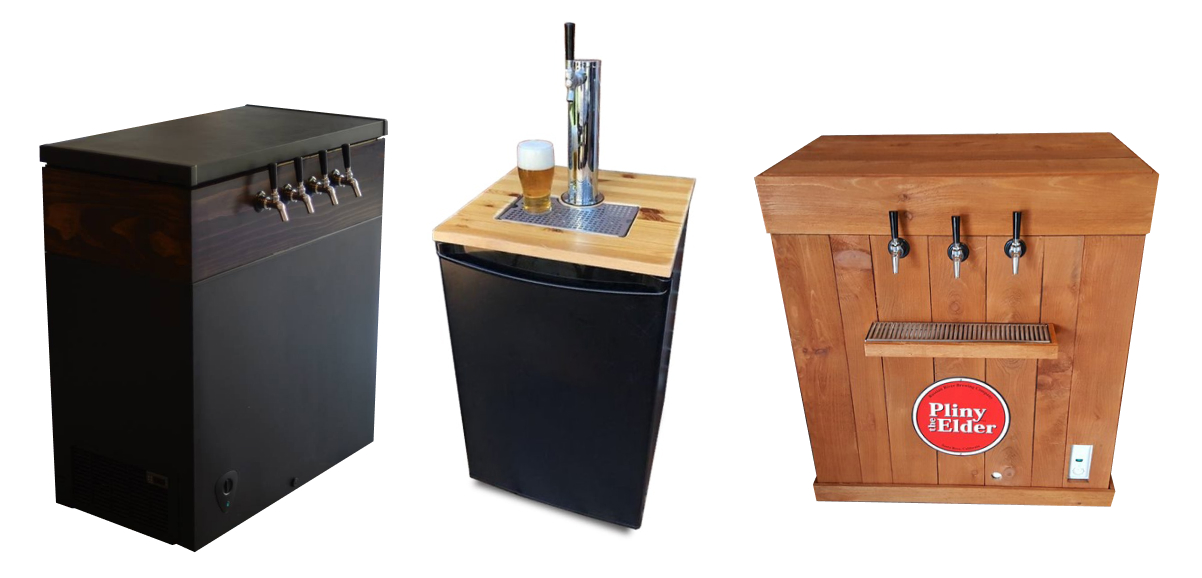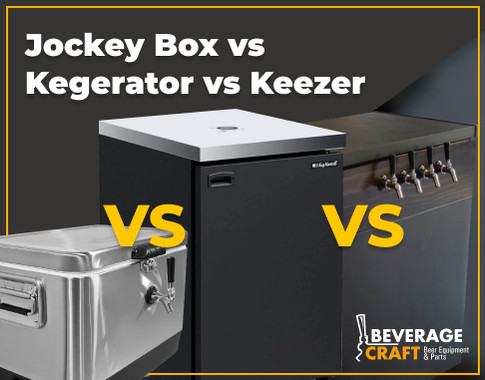Jockey Box vs. Kegerator vs. Keezer
Posted by Ron on 26th Oct 2023
In this article, we'll delve into the distinct features of jockey boxes, kegerators, and keezers – all essential components for home beer dispensing. With the growing interest in these systems, it's crucial to understand the differences between them to make an informed choice that suits your preferences and needs.
The Difference Between Jockey Box, Kegerator and Keezer
Even though a jockey box, kegerator, and keezer are all types of beer dispensing systems and serve roughly the same purpose (cooling and dispensing beer), they differ a lot based on their functionality and design. So, what is the difference between a keezer and kegerator (and a jockey box, for that matter)?
To put it simply:
- Jockey box is a portable beer dispensing system for outdoor events like picnics, backyard and tailgate parties
- Kegerator is a dedicated refrigerator for dispensing kegged beer in both home and commercial applications
- Keezer is a converted chest freezer used for storing and serving beer at home.
What Is a Jockey Box?

A jockey box is a portable and compact beer dispensing system. This portable kegerator typically consists of a cooler with a cooling coil or plate submerged in ice and a dispensing faucet on top.
The beer is passed through the cooling coil or plate, which is surrounded by ice, to maintain the recommended serving temperature.
If you’re looking for a nice portable kegerator, be sure to check the selection on the Beverage Craft website. We always have plenty of jockey boxes for sale.
What Is a Kegerator?

A kegerator is a portable keg fridge specifically designed to store and dispense kegs of beer. It comprises a refrigerated cabinet with a tap tower on top, CO2 canisters, and hoses for dispensing the beer.
The keg is stored inside the kegerator, and the cooling system keeps the beer at the ideal temperature.
What is a kegerator used for? Kegerators are commonly utilized in homes, bars, or restaurants for continuous beer dispensing.
If you need a kegerator for your home or bar, check out the selection of kegerators for sale on the Beverage Craft website.
What Is a Keezer?

What is a keezer? A keezer (which is not a real word but rather a portmanteau of keg and freezer), is a freezer that has been converted into a beer dispensing system. It involves transforming a chest freezer into a temperature-controlled chest freezer kegerator for storing and dispensing kegs.
A temperature controller and CO2 system are added to regulate the chest freezer keezer's temperature and maintain the beer's freshness.
If you’d like to try and build a keezer at home, this could be easily done — get inspired by these beer keezer ideas from our blog.
Kegerator vs. Jockey Box vs. Keezer
A jockey box, kegerator, and keezer are all popular options for dispensing draft beer, each with its own pros and cons. Let's take a closer look and do the keezer vs. kegerator vs. jockey box comparison.
Jockey Box Pros & Cons
Pros
- Portability Jockey boxes are highly portable and ideal for outdoor events like picnics, parties, or festivals. They are usually built in a compact and lightweight design, making them easy to transport.
- Quick cooling Jockey boxes are designed to cool beer as it is poured through a coil/plate immersed in ice or a cooling agent, ensuring rapid cooling and refreshing beer.
- Cost-effective Compared to kegerators or keezers, jockey boxes are generally less expensive. If you frequently host outdoor events or parties, a jockey box can be a more affordable option.
Cons
- Limited storage Jockey boxes don't come with built-in storage for kegs or beer, making it necessary to have a separate cooler or ice chest to keep the kegs cold.
- Frequent ice refills Since jockey boxes rely on ice or a cooling agent to keep the beer cold, you will need to replenish the ice regularly. This can be inconvenient, especially for longer events or gatherings.
Kegerator Pros & Cons
Pros
- Temperature control Kegerators typically come with precise temperature controls, allowing you to maintain the perfect serving temperature for your beer.
- Convenient storage Kegerators often have built-in space to store kegs, eliminating the need for additional coolers or ice. This makes it easier to keep multiple kegs at the desired temperature, ready for dispensing.
- Long-lasting Kegerators are designed to last for many years, providing a reliable and consistent way to enjoy draft beer at home or in commercial settings.
Cons
- Limited portability Unlike jockey boxes, kegerators are stationary appliances that are difficult to move around. Once installed, they are not meant to be transported frequently.
- Higher cost Kegerators are generally more expensive than jockey boxes due to their features, build quality and cooling mechanisms.
Keezer Pros & Cons
Pros
- Large capacity A keezer offers ample space to store multiple kegs, making it suitable for homebrewers or those who love having various beer options on tap.
- Customization A keezer allows for customization in terms of design and aesthetic appeal. Many beer enthusiasts enjoy building their own keezer to match their personal style or home decor.
- Temperature control Similar to kegerators, keezers provide the ability to control and adjust the serving temperature, ensuring the best taste for different beer styles.
Cons
- Space requirements Keezers are typically larger than kegerators or jockey boxes, requiring more floor space. They may not be suitable for smaller homes or apartments.
- DIY construction Building a keezer often requires more technical skills and knowledge to convert a freezer into a functional keg-dispensing device.
Choosing the Right Option for Your Draft Beer Dispensing Needs
So, these have been the three main draft beer cooling options — jockey box, kegerator, and keezer. Which one is the best beer dispensing solution?
Overall, the choice between a jockey box, kegerator, or keezer depends on your specific needs, budget, and intended use. All three have their advantages and disadvantages, and it's important to consider factors like portability, capacity, temperature control, and cost before deciding what is better — keezer or kegerator or jockey box.
You May Be Also Interested In
- Make Your Own Keg Fridge at Home
- Best Kegerator for Home Use 2023
- Cold Plate VS Coil Jockey Box: Which One to Choose
- What to do if the beer is pouring foamy, flat, wild, cloudy & off-tasting?




